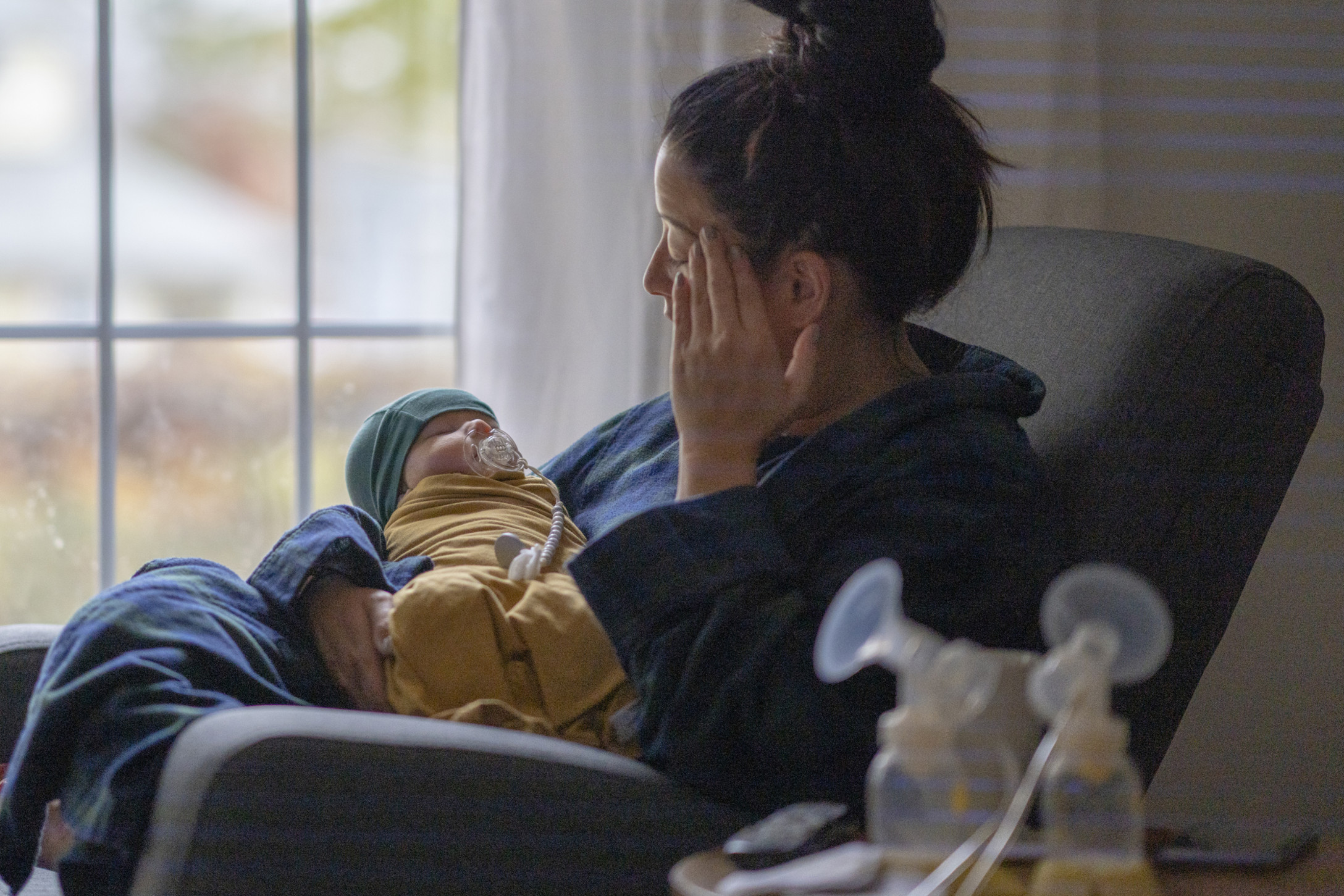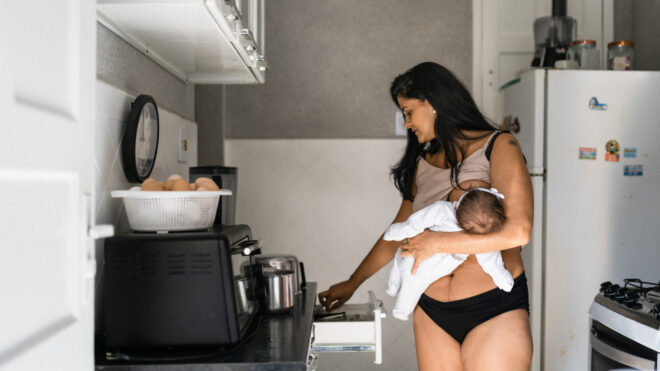
Being a mom is hard — and extremely rewarding — from start to finish. Sometimes, the hard part of your mom story starts before conception and other times after birth, and sometimes even further down the motherhood journey, like when your sweet baby hits the teen years. But we can always rely on motherhood to be completely worth every single minute of lost sleep, gray hair, and sacrifice. But often, one of the hardest parts for some moms, is coping with postpartum depression in the fourth trimester.
Let me tell you: Moms are warriors. Moms are strong in all ways (emotionally, mentally, and physically). After all, we create human beings, which seems like a super power. But even the strongest people need help sometimes because while us moms may do some super hero-like things, we are human. Giving birth and having your entire life change in an instant can be unexpectedly triggering. Think about it: Your body, the way you think, your priorities, how you even exist in the world is now laser focused on this tiny human you are responsible for. It's actually surprising that the rate of postpartum depression isn't higher than the reported 15% of the population.
I honestly felt like I lost my mind from the moment they laid my daughter on my chest. I was simultaneously laughing and crying at the same time. I was elated and terrified. I had just been through the most traumatic thing of my life and given birth to the most amazing human I had ever met and now, I was the person in charge of not only keeping her alive, but not destroying the perfection they put in my arms. In those moments, I just knew I was going to fail. I may have never been a mom, but I had been a daughter and I felt the moment I left the hospital, I was going to mess up. That fear consumed my thoughts. The thing I didn’t know is that we all mess up. But that’s not the important part. The important part is how we love our babies regardless of whatever else is going on and work through those overwhelming feelings of failure and fear.
But working through those emotions can be incredibly daunting, and when postpartum depression (aka, major depressive disorder with peripartum onset) sets in, it can feel like it's taking you down. If this sounds familiar, don't worry mama, there is hope and help.
What Is Postpartum Depression?
Postpartum depression is more than the baby blues that most moms experience from the changing hormones after giving birth. PPD involves a persistent low mood for an extended period of time that can include intense feelings of sadness, anxiety, or despair that prevent moms from being able to perform basic daily tasks effectively.
This doesn’t mean that a mom loves her baby any less, it’s a mental health issue that can thankfully be treated. It can happen to any mom at any time within the first week through the first year after giving birth, but most often occurs in the first three weeks after giving birth.
What Causes PPD?
Several things can contribute to postpartum depression, including:
-
Changes in hormone levels. Estrogen and progesterone levels can drastically decrease immediately after giving birth. These radically changing levels can trigger major depressive episodes similar to how hormone level changes can trigger mood swings before a period.
-
History of depression. Women who are predisposed to depressive episodes currently or in the past are at an increased risk of developing PPD and, therefore, should tell their doctor before they even get pregnant, if possible. For those already being treated for depression, they should also continue to take their medications.
-
Emotional factors. An unplanned pregnancy or a pregnancy that doesn’t go as planned can cause feelings of doubt or cause mixed emotions about the pregnancy and baby. Adjusting to pregnancy and or a new baby, healthy or sick, can also trigger feelings of sadness, anger, and guilt. All of this can have a negative effect on the mother’s emotional state.
-
Exhaustion. Being pregnant, giving birth, and being a mom are all time-consuming and exhausting. It can take a long time to get in the mom groove and regain your strength and energy. Fatigue can contribute to moms experiencing PPD.
-
Lifestyle. A stressful life event, like the recent death of a loved one, being financially strapped, a family illness, moving to a new city, or having more children that demand your time and attention can increase the risk of PPD. A lack of support from others and uncertainty about the future can also increase the risk of developing postpartum depression.
What Are the Symptoms of Postpartum Depression?
These are postpartum depression signs and symptoms to be on the lookout for:
- Withdrawing from family and friends.
- Loss of appetite or eating much more than usual.
- Severe mood swings and/or depressed mood.
- Restlessness.
- Severe anxiety and panic attacks.
- Excessive or inexplicable crying.
- Difficulty bonding with your baby.
- Insomnia or excessive sleeping.
- Extreme exhaustion or loss of energy.
- Loss of interest and no longer finding pleasure in activities you used to enjoy.
- Extreme irritability and anger.
- Constantly afraid that you're not a good enough mother.
- Feeling hopeless.
- Feeling worthlessness, ashamed, guilty, or inadequate.
- Diminished ability to think clearly, concentrate or make decisions.
- Thoughts of self-harm or hurting your baby.
- Suicidal ideation.
Without treatment, postpartum depression can last for months.
What Is Postpartum Psychosis?
Postpartum psychosis is a rare and severe condition that can develop within the first week postpartum. This condition should be taken extremely seriously and you should contact your doctor immediately for treatment if you think you are exhibiting some of these symptoms, as they can be life-threatening. As the Mayo Clinic notes, some signs and symptoms of postpartum psychosis include:
- Confusion and disorientation.
- Obsessive thoughts about your baby.
- Hallucinations and delusions.
- Sleep disturbances.
- Excessive energy and agitation.
- Paranoia.
- Attempts to harm yourself or your baby.
When to See Your Doctor
If you feel you might be experiencing postpartum depression or postpartum psychosis, don’t wait for your postpartum appointment. Call your doctor and make an appointment as soon as possible, especially if you are exhibiting any of the following symptoms;
- Depression lingers beyond two weeks.
- Your symptoms are getting worse.
- Your symptoms make it impossible for you to care for your newborn properly.
- Your symptoms make everyday tasks feel unsurmountable.
- You have thoughts of harming yourself or your baby.
How Is PPD Treated?
PPD can be treated with medications like antidepressants in combination with cognitive behavioral therapy and talk therapy. In cases of postpartum psychosis, electroconvulsive therapy may be required.
The bottom line is that you are not alone and you did nothing wrong. Postpartum depression can happen to anyone. Don't be afraid to seek help and guidance from professionals and support from friends and family. Don't suffer in silence.







